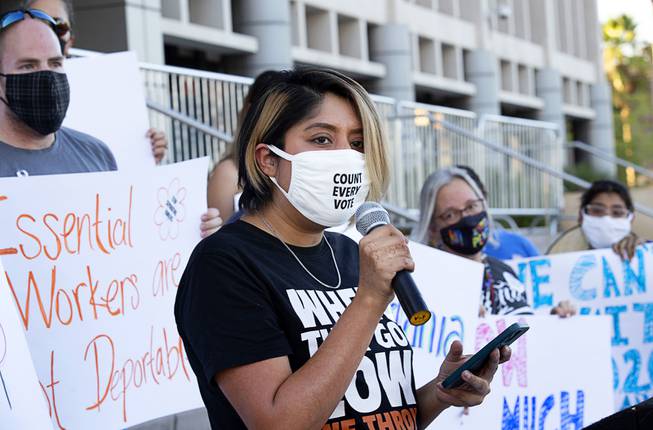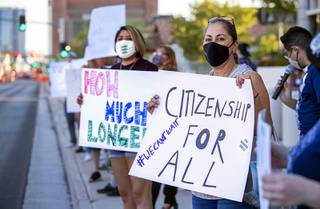
Erika Castro, a DACA recipient, speaks at a rally in front of the Foley Federal Building in downtown Las Vegas Friday, July 2, 2021. Immigrant community members, the Progressive Leadership Alliance of Nevada, Make the Road Nevada, and community partners participated in the rally.
Saturday, July 3, 2021 | 2 a.m.
Erika Castro longs for the day when her parents no longer fear being deported and separated from their children, which would require a president finally delivering on the promise of legislation that would grant a pathway to citizenship for more than 11 million undocumented immigrants living in the U.S.
For the 32-year-old Deferred Action for Childhood Arrivals (DACA) recipient, the joy would be indescribable.
Such a victory would dramatically improve their lives, she said Friday evening during a rally urging the Nevada congressional delegation and the White House to act on immigration reform: “Not today, not tomorrow, not next week ... but now,” the group of advocates chanted in front of the Foley Federal Building and U.S. Courthouse in downtown Las Vegas.
They were calling on Nevada lawmakers, specifically Sen. Catherine Cortez-Masto, D-Nev., to propose legislation that addresses that relief.
The rally came on the eve of Vice President Kamala Harris' visit to Las Vegas and the same day President Joe Biden called for bipartisan action for a pathway to citizenship during a naturalization ceremony at the White House.
Biden’s proposal, according to his remarks, would include immigrants who were brought to the U.S. illegally as children like Castro, undocumented people with temporary protected status and farm workers.
Biden’s comments, however, stopped short of the legislative proposal he’s endorsed, which includes a much broader option for most immigrants to apply for legal status and then seek citizenship.
In February, Biden and congressional Democrats proposed a major immigration overhaul that included an eight-year pathway to citizenship for the millions of people living in the U.S. illegally. Republican lawmakers blocked the effort and have criticized the administration for the rise in people attempting to cross the southern border without visas.
Like previous presidents, “this administration made a lot of promises and we’re here to remind them that they can't forget about us,” said Castro, noting that the undocumented populations, including essential workers, did not receive federal COVID relief, even though they risked their lives to keep the country going.
“It doesn’t matter if they’re Democratic or Republican that have been in power — they haven’t done anything for us,” said Castro with cautious optimism about the Biden administration. “Even though this administration is not attacking us like the previous one, we still need immigration reform.”
Castro, an organizer with the Progressive Leadership Alliance of Nevada, was only 3 years old when her young parents left Mexico City seeking a better life for her in the U.S. Because of her parents’ illegal immigrant status, she said, they’ve endured jobs where they’ve been taken advantage of.
A legal status would allow them to find better jobs and better life opportunities — and shed anxiety about being pulled over by police and surviving paycheck to paycheck.
In 2012, Castro was granted deferred action under DACA, a program created through an executive order by President Barack Obama. That’s when she lost her fear to speak up. Still, that is only a permit to live and work here that expires every two years.
Former President Donald Trump’s administration attempted to end it, but it has endured court challenges.
Her family’s immigration status did not allow them to travel to Mexico when her grandfather got deathly ill in 2019. Castro was left to tell her mother that he had died, she told the small crowd Friday, her hand shaking.
“Can you only imagine that kind of heartache?” she said.
Asked what the U.S. means to her, Castro said: “It’s my home. It’s where I grew up; where I graduated; where I’ve fallen in love; where my heart’s been broken. I’ve done everything here. I love my culture; I love my birth country and hope to see it and my family again one day.”
DACA recipients aren’t allowed to travel to their birth countries.
Karla Ramirez, an organizer with the Make the Road Nevada advocacy group, also told the crowd about her not being able to realize a dream of seeing her grandfather back in Mexico before he died.
Ramirez, who was a year old when her parents brought her to the U.S., had to watch his funeral through a video call, she lamented.
Ramirez, a former DACA recipient who recently obtained permanent residency, said she’s still part of a mixed-status family. The fight for her is not over, she said.
“We’re not free until every person living in fear is free,” she said. Urging Congress to allow citizenship for all, she added, “We know you can do it. Our communities deserve it.”
The Associated Press contributed to this report.

